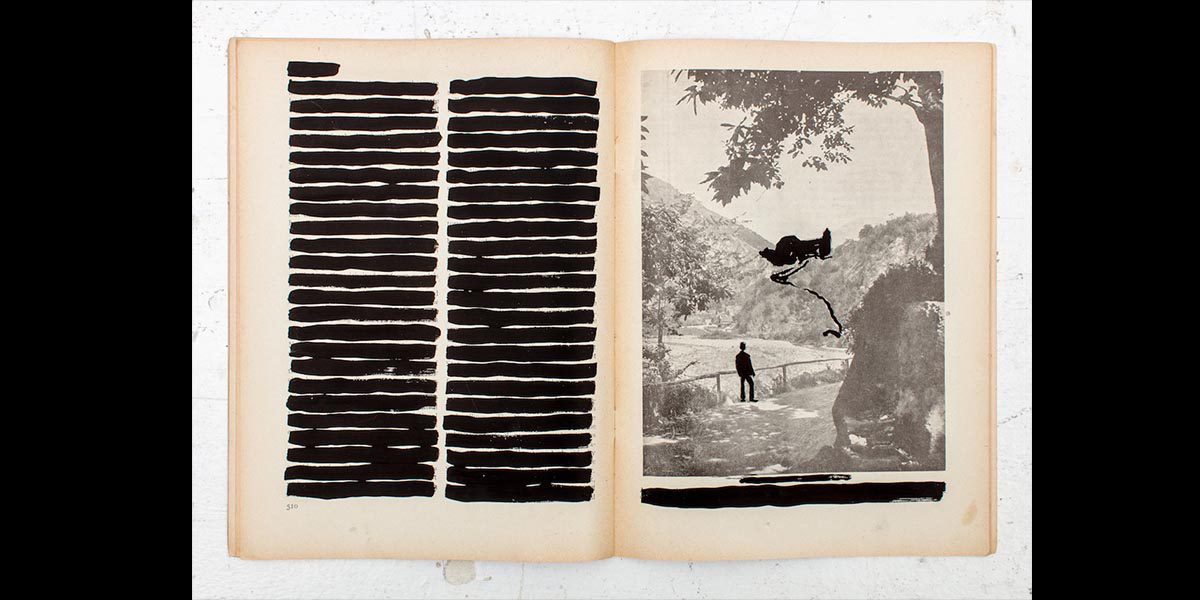The Freud Museum is presenting BLACK BOOK, an exhibition of new work by Gideon Rubin and the latest in a critically acclaimed series curated by James Putnam. The artist’s specially created project for Freud’s final residence relates to the era of the late 1930s, when Freud left Vienna for London.
Seemingly ‘innocent’ images belie their sinister undertones
The show comprises a series of paintings on canvas, linen and paper with subject matter drawn from original pre-WW2 German magazines that Rubin has collected specifically for the project. These magazines contain idealised images of heath and efficiency to promote the myth of Aryan supremacy as Nazi propaganda. Rubin has subverted these images in his characteristic style by masking out the faces, Nazi references and swastika motifs. This process relates to our human tendency to block out unpleasant memories from our psyche. Working on them has been his way to engage with the past on a personal level. He identifies Freud’s narrow escape from Vienna in 1938 with his own maternal grandparents’ escape from Nazi persecution, fleeing Romania at the last moment in 1939. On a more contemporary level, the theme relates to the current world crisis of refugees fleeing from conflicts.

Rubin situates this imagery within the context of Freud’s home. But these seemingly ‘innocent’ images belie their sinister undertones that allude to the Nazis subsequent mission to exterminate the Jews with Hitler’s ‘Final Solution’. Mein Kampf was translated into English and published in London in 1939. Rubin has also acquired an original edition of Hitler’s infamous autobiography and has systematically blacked out every page to create a series of abstract monochrome compositions. His systematic blacking out of Mein Kampf and the Nazi propaganda images represents a symbolic neutralising and negating of their sinister associations reflected in the exhibition’s title: BLACK BOOK.
The Freud Museum is located within the former London home of Sigmund Freud, the founder of psychoanalysis, and his daughter Anna, a pioneer of child psychoanalysis. The Freud family settled here after fleeing Nazi persecution in Austria in 1938. The centrepiece of the Museum is Freud’s extraordinary study, containing his iconic psychoanalytic couch, together with countless books and antiquities. Since its inception in 1986, the museum has developed an international reputation for its collections, research, conferences, events and contemporary art exhibitions. Previous exhibitions at the museum include projects by Sophie Calle, Sarah Lucas, Louise Bourgeois, Tim Noble & Sue Webster, Mark Wallinger and Alice Anderson.
Gideon Rubin (b.1973) is an Israeli artist who lives and works in London. He received his BFA from School of Visual Arts in New York and MFA from Slade School of Art in London. He has had numerous international solo exhibitions, most recent include ‘Memory goes as far as this morning: A dialogue between Gideon Rubin and Shu Qun’ at Chengdu MoCA, ‘Memory Goes as Far as This Morning’ at Herzliya Museum of Contemporary Art Israel/San Jose ICA (2015/16), ‘Questions of Forgiveness’ at Galerie Karsten Greve, Paris (2016), ‘Delivering Newspapers’ at ROKEBY, London (2015), ‘On the Road’ at Hosfelt Gallery, San Francisco (2013). He received the ‘Shifting Foundation’ grant in 2014 and Outset residency program, Tel Aviv (2013). Gideon Rubin is represented by Galerie Karsten Greve Paris, Cologne, St Moritz, ROKEBY, London, Hosfelt Gallery, San Francisco and Alon Segev Gallery, Tel Aviv.
Exhibition supported by Outset Contemporary Art Fund
An accompanying original artwork created for the exhibition will be available to purchase through the Museum. Gideon Rubin and a special guest will be in conversation at the museum in February 2018 (date TBC), moderated by curator James Putnam.

